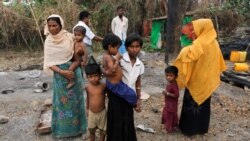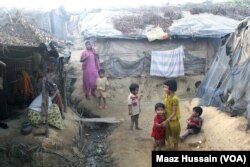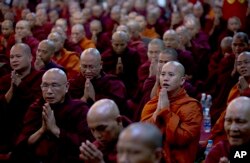Since 2012, the violence in Myanmar’s Rakhine state has displaced thousands of people. According to the United Nations Human Rights Council, that number has surpassed 140,000.
In recent months, videos of abuse by Burmese security forces have emerged, coupled with allegations of rape and the burning of Rohingya Muslim villages. These actions prompted ASEAN foreign ministers to gather in December 2015 to discuss the situation, and a series of rallies led by Malaysian Prime Minister Najib Razak.
Last week, Lee Yang-hee, the U.N. special rapporteur on human rights for Myanmar, sat down with the country’s de facto leader, Aung San Suu Kyi, to discuss the situation.
Phil Robertson, the Asia Deputy Director for Human Rights Watch, says that such events show just how dire the situation is in “particular the areas around Maungdaw and Buthidaung, which were affected by the security sweeps/crackdown that took place after the original attacks against the border patrol.”
Robertson cites instances of humanitarian aid still not reaching locations within Rakhine state and ongoing destruction of structures by security forces, evidenced by satellite imagery, as further examples of the challenges facing the Rohingya.
Improving signs?
Hunter Marston, an independent analyst who previously worked at the U.S. embassy in Myanmar, adds that Lee Yang-hee’s visit was somewhat of a good sign, “but the unfortunate reality is that Lee was not allowed to speak with just anybody. She was kept to the pre-approved government list and not allowed in certain villages.”
The Burmese government did investigate allegations of wrongdoing, but Marston characterizes the results as, “Categorical denying of the situation, the reality on the ground.”
While the events in Rakhine state have captured international media headlines, problems have persisted for some time.
“Starting with the 1960s, the military juntas increasingly repressed the Rohingya, and in 1982, the Burmese citizenship law finally stripped them of citizenship, not recognizing them as a legitimate ethnic group under their constitution," Marston says.
In 2012 during ethnic infighting, Robertson says, “Human Rights Watch investigated it and found very clear evidence of ethnic cleansing and crimes against humanity committed by ethnic Rakhine Buddhists with the support of security forces against Rohingya.”
The future
The intense international focus on the situation in the Rakhine state and Lee Yang-hee’s recent visit isn’t enough, says Marston, to bring about an optimistic view of the situation, given that Aung San Suu Kyi does not use the term Rohingya and has asked others not to do so as well.
However, Marston notes, “There is room for improvement, of course, because things are quite bad. That said, they could get a lot worse. While a lot of people are throwing around the term ‘genocide,’ I don’t think we’ve quite reached that yet.”
If Aung San Suu Kyi and her government take a more proactive role, then there is hope.
“I don’t think at this point it can be expected [things can be resolved] using the current tactics that they’re engaged in,” says Robertson, “I think that the Burmese government has to stand up, has to basically confront the military and say, ‘Look, you cannot use these kinds of rights abusing tactics in a systematic way, as you’re doing in these areas, and expect us to remain quiet.’”
Marston says if ASEAN, and especially Indonesia, as the most populous Muslim nation, engage closely with the Burmese government, change might occur.








